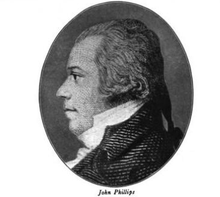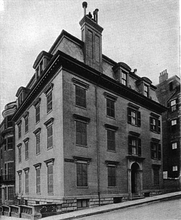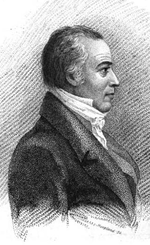John Phillips (mayor)
| John Phillips | |
|---|---|
 | |
| 1st Mayor of Boston, Massachusetts | |
|
In office May 1, 1822[1] – May 1, 1823[2] | |
| Preceded by |
Eliphalet Williams (Chairman of the Board of Selectmen)[3] |
| Succeeded by | Josiah Quincy III |
| Personal details | |
| Born | November 26, 1770 |
| Died | May 29, 1823 (aged 52) |
| Spouse(s) | Sally Walley (m. December 1794) |
| Alma mater | Harvard University |
| Profession |
Attorney (admitted to the Massachusetts bar 1791) |
John Phillips (November 26, 1770 – May 29, 1823) was an American politician, serving as the first mayor of Boston, Massachusetts from 1822 to 1823. He was the father of abolitionist Wendell Phillips.
Life and politics
He graduated from Harvard College in 1788.[4] In 1794, he was invited to deliver the annual Fourth of July oration before the people of Boston. In 1800, he was made public prosecutor, and in 1803 was chosen representative to the Massachusetts General Court. He was sent to the Massachusetts Senate in 1804, serving as presiding officer from 1813 to 1823. He was elected a Fellow of the American Academy of Arts and Sciences in 1810,[5] and in 1812, he was chosen a member of the corporation of Harvard. Phillips was also elected a member of the American Antiquarian Society in 1813.[6]
In 1820, he was a member of the convention that met to consider the revision of the state constitution, and he took an active part in the proceedings of that body. Phillips was also active in the agitation for the adoption of a city government in Boston, and was chairman of the committee of twelve that drew up and reported on a city charter for the town in 1822. In the choice for mayor that followed, Harrison Gray Otis and Josiah Quincy III were the chief candidates for the office, but, as neither was able to secure an election, their friends agreed on Phillips, who was elected on 16 April 1822. At the close of his term of office the precarious condition of his health led him to decline a re-election.[7]
Honors
Phillips Street and the Phillips School (later Northeast Institute of Industrial Technology) in Boston's Beacon Hill neighborhood were named after John Phillips.
Gallery
-

Phillips lived on Beacon Street, Boston (corner of Walnut Street), 1804-1823[1]
-

Portrait of Phillips, from Boston Monthly Magazine, 1825
- ^ State Street Trust Company. Forty of Boston's historic houses. 1912.
See also
- Timeline of Boston, 1820s
Notes
- ↑ A Catalogue of the City Councils of Boston, 1822-1908, Roxbury, 1846-1867, Charlestown 1847-1873 and of The Selectmen of Boston, 1634-1822 also of Various Other Town and Municipal officers, Boston, MA: City of Boston Printing Department, 1909, p. 212
- ↑ A Catalogue of the City Councils of Boston, 1822-1908, Roxbury, 1846-1867, Charlestown 1847-1873 and of The Selectmen of Boston, 1634-1822 also of Various Other Town and Municipal officers, Boston, MA: City of Boston Printing Department, 1909, p. 213
- ↑ Quincy, Josiah (1852), A municipal history of the Town and City of Boston during two Centuries, Boston, MA: Charles Little and James Brown, p. 42.
- ↑
 Chisholm, Hugh, ed. (1911). "Phillips, Wendell". Encyclopædia Britannica (11th ed.). Cambridge University Press.
Chisholm, Hugh, ed. (1911). "Phillips, Wendell". Encyclopædia Britannica (11th ed.). Cambridge University Press. - ↑ "Book of Members, 1780-2010: Chapter P" (PDF). American Academy of Arts and Sciences. Retrieved 18 April 2011.
- ↑ American Antiquarian Society Members Directory
- ↑
 Wilson, James Grant; Fiske, John, eds. (1900). "Phillips, John". Appletons' Cyclopædia of American Biography. New York: D. Appleton.
Wilson, James Grant; Fiske, John, eds. (1900). "Phillips, John". Appletons' Cyclopædia of American Biography. New York: D. Appleton.
References
- Mayors of Boston: An Illustrated Epitome of who the Mayors Have Been and What they Have Done, Boston, MA: State Street Trust Company, (1914)
- The Boston Directory Published by Published by George Adams, (1851). p. 6.
External links
| Political offices | ||
|---|---|---|
| Preceded by None |
1st Mayor of Boston, Massachusetts May 1, 1822 – May 1, 1823 |
Succeeded by Josiah Quincy III |
| Preceded by Samuel Dana |
President of the Massachusetts Senate 1813–1823 |
Succeeded by Nathaniel Silsbee |
|